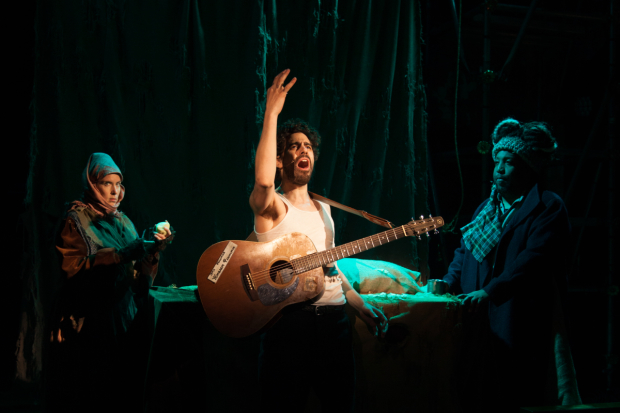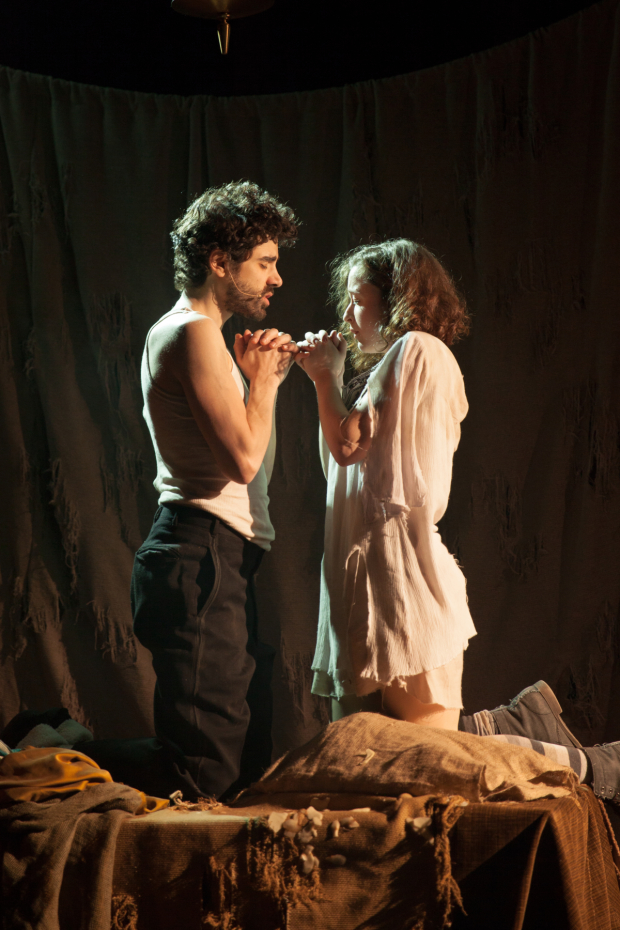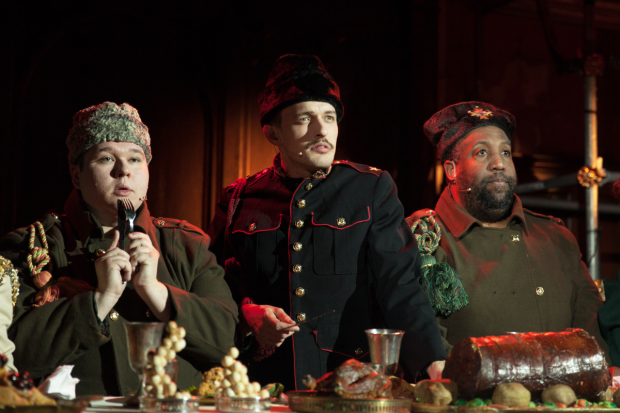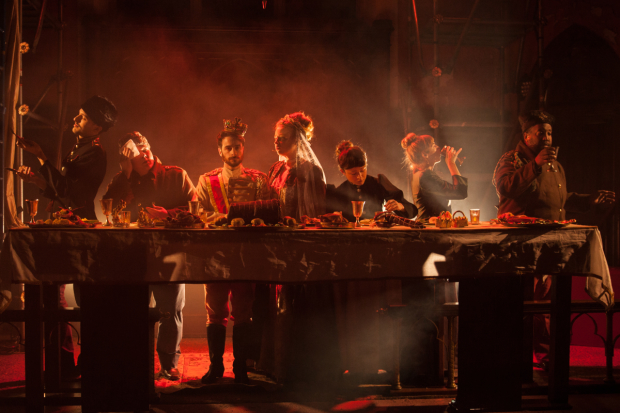Beardo

(© Suzi Sadler)
One hundred years after his grisly assassination, Grigori Rasputin still haunts our collective imagination. A century of pop culture depictions of the infamous mystic and confidant to the last Tsar of Russia has left this real historical figure steeped in myth and superstition, a trend that Dave Malloy and Jason Craig do nothing to reverse in their wonderfully strange new musical, Beardo, now receiving its New York debut with Pipeline Theatre Company. Overflowing with mystery and mirth, this tragicomic riff on a familiar tale is an unforgettable theatrical experience.
Much of that has to do with the show's unique setting: It performs in the ghostly sanctuary of St. John's Lutheran Church in Greenpoint, Brooklyn. We enter the dimly lit nave to the sound of chanting Orthodox monks. Paint peels from the walls and patches are missing from the ceiling. We cannot tell if the scaffolding and torn drop cloths surrounding the space are part of a major renovation effort, or if they belong to Carolyn Mraz's set.

(© Suzi Sadler)
Director Ellie Heyman's production seems to organically emerge from this crumbling house of worship. We first see Beardo (Damon Daunno) face down on the altar, grasping at something deep inside (Craig and Malloy never use the name "Rasputin" in their script, but we know who Beardo is). A "shack man" (Rolls Andre) takes him back to his home, where he seduces the man's sister-in-law (a fierce Liz Leimkuhler) and scandalizes his wife (Shaye Troha).
After he wills a long black robe to fall from the heavens, he travels to St. Petersburg where he brazenly walks into the palace, like a tomcat claiming new territory. "I am going to grab your ass, because this will help us both," he tells the Tsarista (a commanding Alex Highsmith) during their first meeting. He is just as brazen with the shrieking and effeminate Tsar (the hilarious Willy Appelman), and this somehow convinces the royal family that this is the man who can heal their hemophiliac son.
Beardo's irresistible pull is by far the most inscrutable aspect of Craig's book: He is filthy and uncouth. He employs the spurious logic of a second-rate motivational speaker and is profoundly inarticulate in doing so (although we Americans know this is no barrier to the halls of power). Still, we wonder how this eccentric sadist weaseled his way into the perfumed stratosphere of the largest contiguous empire on earth. It couldn't be just because he is really ridiculously attractive, could it? It must be magic.
Craig wisely maintains an air of inexplicability around Rasputin, forcing us to experience the same bewilderment doubtlessly felt in imperial court. Daunno unleashes his soaring vocals like a rock star, concentrating his energy in his lips and pelvis. He is animalistic and mentally unbalanced — the women of St. Petersburg can't get enough of him.

(© Suzi Sadler)
One character who never falls under Beardo's spell is the smug aristocrat Yusapoof (Brian Bock), who seems to be based on Rasputin's alleged killer, Felix Yusupov. Bock endows the Crimean count with delicious disdain. He sneers at the unwashed outsider, venom dripping from his every syllable. He is the only actor in the cast who can make Craig's unfailingly crude language sound sharp and precise. He plots Beardo's murder with two henchmen (Rolls Andre and Ben Langhorst) in a second act ballet inspired by the black swan sequence of Swan Lake. Yes, it's as ludicrously funny as it sounds (choreography by Jeff and Rick Kuperman).
As is the case with his more grandiose Russian-inspired musical, Natasha, Pierre & The Great Comet of 1812, Malloy employs an eclectic mix of styles for a score that is both tuneful and daring. A string quintet provides the accompaniment, offering a surprisingly robust sound under the baton of Sam Kulik. Music director Ian Axness exploits the natural acoustics of the church, resulting in stunning vocal performances throughout and the most breathtaking first act finale this side of Les Misérables.

(© Suzi Sadler)
Surprises abound in Heyman's earthy production. The smell of incense and grilled meat wafts over the pews as the courtiers masticate their food, endlessly gossiping and consuming while the peasants starve outside in the Russian winter. Katja Andreiev's costumes impressively capture their decadence, but on an off-off-Broadway budget (the men's military tassels appear stolen from heavy draperies). Mary Ellen Stebbins bathes the sanctuary in spectral lighting, which pulses and flickers with Beardo's visions. A demonic voice occasionally echoes his speech (creepy sound design by Dan Moses Schreier and Joshua Reid). We come to believe that something truly evil is afoot, but we are at a loss to explain it.
While mundane rationales for Rasputin's improbable story quietly appear all night, they quickly scurry back behind a wall as soon as they are sighted by the audience. Beardo thrillingly leaves us to ponder what we just saw and to distrust any immediate conclusions we might make about it.











